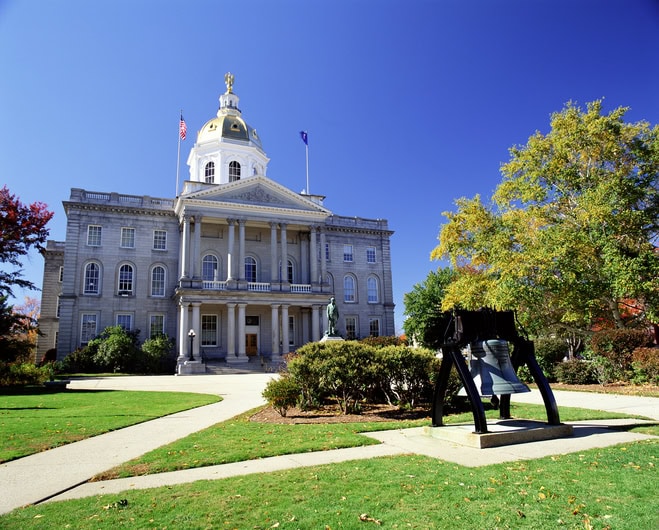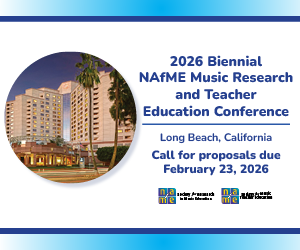NAfME BLOG
Advocacy in Action: New Hampshire Advocates Work to Save Arts Education

/ News Posts / Advocacy in Action: New Hampshire Advocates Work to Save Arts Education
Advocacy in Action
New Hampshire Advocates Work to Save Arts Education
By Jazzmone Sutton, NAfME Senior Manager for State Advocacy and Equity
In 2022, the New Hampshire House of Representatives introduced HB 1671 to redefine the state’s definition of an “adequate education” as focused on subjects like English, math, science, and social studies. Through this action, the bill threatened to diminish the state’s commitment to arts education. Recognizing the potential consequences, advocates from the New Hampshire Music Educators Association (NHMEA) reached out to NAfME to strategize a path forward. Through coordinated efforts, NHMEA and other advocates successfully preserved access to arts education and ensured that music was enumerated as a required subject provided by the state. What initially seemed like a threat to the arts became a victory, reaffirming the importance of music education.
A New Challenge: HB 283
Just three years later in January 2025, another bill, HB 283, was introduced with a very similar goal: to limit the scope of the state’s educational requirement. Once again, music and arts education were at risk of being eliminated from the state’s responsibilities. This time, advocates came out in droves to a House Education Committee hearing on HB 283. In fact, so many advocates were in attendance that the hearing had to be moved to a larger meeting room to accommodate the crowd.
Among those present was Joe Mundy, the former President of NHMEA and Director of K–12 Performing Arts for the Salem School District. Mundy’s initial plan was to listen to others’ testimonies and offer support with his presence, but as the hearing went on, he felt inspired to speak up.
“I care deeply about music and arts and anything that I can do to keep it alive and well is important.”—Joe Mundy
Along with Mundy, more than 30,000 people either spoke at the meeting or submitted written testimony in opposition to the bill. The outflow of support for music and the arts sent a clear message to decision-makers about the value of the state providing access to these subjects. Among those speaking in-person was Lisa A. Walker, Superintendent of the Grantham School District. As a former arts educator and parent of a chorus student, Superintendent Walker has a personal connection to this legislation.
During her testimony, Walker spoke about how her daughter has grown in ways that were not possible in other subjects: “Chorus isn’t just keeping her engaged; it’s opening her up in a way that math and English can’t do.” As a leader, Lisa also understood the larger picture of the community engagement around this legislation. “I’ve never seen numbers like that,” she remarked when discussing the turnout. “People showed up to talk about how it [the bill] impacted them.”
In addition to the written and spoken testimonies, leaders with NHMEA used NAfME’s Grassroots Action Center to connect advocates directly to their legislators with template messaging. NAfME shared the campaign with members of the Music Education Policy Roundtable to amplify the messages as well. More than 1,400 messages were sent via NAfME’s Grassroots Action Center in one week.
Unified in Voice
Thanks to the collective action of a variety of advocates, the bill was defeated in committee. As a result, the modification from the 2022 bill, which included music and arts education as required subjects, remained intact. This is a testament to the power of advocacy.
Advocacy for Everyone
When asked for advice regarding participating in advocacy, Mundy and Walker shared the following:
- Start Locally—Talking with your local school board and administrators, or engaging other parents and community members, is an easy way to build support for music education. The more your community understands the importance of music education, the more likely they are to advocate for positive change.
- Be Willing to Speak Out—Share your story about music education’s impact on your life or the life of your student. You can do this by writing letters, calling your legislator, or speaking at a hearing.
- Remember You’re Not Alone—The power of music education connects you to the larger community of educators, students, parents, businesses, and community members who know the deep impact of music education. Tap into that community to strengthen your advocacy efforts.
- Get Involved When You Can—You may not be able to get to a hearing on a bill, but you can share information, write a letter, encourage others to be engaged, and so much more. Every effort counts!
Interested in reprinting this article? Please review the reprint guidelines.
The National Association for Music Education (NAfME) provides a number of forums for the sharing of information and opinion, including blogs and postings on our website, articles and columns in our magazines and journals, and postings to our Amplify member portal. Unless specifically noted, the views expressed in these media do not necessarily represent the policy or views of the Association, its officers, or its employees.
Published Date
March 31, 2025
Category
- Advocacy
- State Advocacy & Public Policy
Copyright
March 31, 2025. © National Association for Music Education (NAfME.org)



